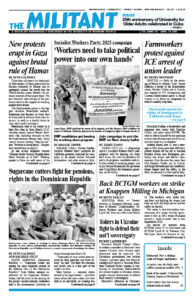Amid growing anger, working people are feeling the squeeze of persistent high prices for groceries, rents, child care and other necessities. And some favorites, like coffee, eggs and chocolate, have been rising at record rates. “If your favorite coffee beans have vanished from the shelves, don’t worry, they will return soon,” Reuters reported March 27. “The bad news is they will be up to 25% more expensive.”
Many workers simply can’t afford it. As coffee prices rose 4.6% last year, the amount of roast and ground coffee sold in North America and Europe fell 3.8%. Projected continuing spikes in coffee prices over the coming weeks will mean workers either need to cut back on their morning coffee or ditch something else to pay for it.
The farmers and agricultural workers who plant, grow and harvest these beans don’t benefit from the price increases. Some 60% of the world’s coffee is produced by an estimated 12.5 million people toiling on farms no larger than 50 acres — most even smaller than that. But close to half of them live in poverty.
Chocolate products have jumped by 10% to 20% over the past year as the price of cocoa has more than doubled since the beginning of 2024.
A handful of giant companies that dominate the egg industry, like Global Eggs, are reaping big profits as prices soared to over $10 a dozen in stores earlier this year. And they’re consolidating their monopoly. Luxembourg-based Global Eggs, under the control of Brazilian billionaire “Egg King” Ricardo Faria, has been expanding its operations worldwide. It bought out Grupo Hevo, based in Spain, in November, and is now putting down $1.1 billion for Hillandale Farms, one of the largest U.S. chicken egg suppliers.
Global Eggs, like other giant distributors, attributes the price spike to shortages caused by the bird flu epidemic. But what’s really happening is bosses are utilizing the epidemic to maximize their profits as working people foot the bill. Cal-Maine Foods, the largest egg producer in the U.S., reported $356 million in gross quarterly profits last month, a fourfold increase over a year ago.
High prices for groceries, transportation costs, health care, child care, interest payments on credit-card debts and more are the product of the deepening economic and social crisis of the dog-eat-dog capitalist system today, which the bosses and bankers seek to offload on the backs of workers and farmers.
Capitalist crisis hits workers hard
In an effort to make ends meet, many working-class families are forced to cut back on spending or go deeper in debt. “Footfall to U.S. stores fell by 4.3% year on year in early March,” reported the Financial Times, with fewer visits to “big-box stores,” like Walmart, Target and Best Buy.
Visits to fast-food restaurants were down 2.8% in February, with orders at breakfast spots — hit with the exorbitant egg prices — dropping by double digits.
Various “consumer surveys” by government agencies and others “add to evidence of gloom” warned the Wall Street Journal March 25. It said that increasing numbers of working people expect both prices and unemployment to rise. One such survey by the University of Michigan showed “consumers’” confidence that economic and social conditions will improve has declined by 27% over the past year.
Of course there’s no such thing as “consumers.” This generalization hides the real class divisions that exist between the working class, who are being hit hard, and the wealthy rulers and their upper-middle-class hangers-on, who keep buying up luxury items like there’s no tomorrow.
The Wall Street Journal has a regular feature called “Mansion Global.” This week they ran an article headlined “$1.7 billion worth of homes on a 4-mile stretch. Welcome to Miami’s richest road.”
It describes the housing on North Bay Road. Homeowners there, among other similarly well-heeled sorts, mostly “new money,” include Barry and Linda Gibb, Shutterstock founder Jonathan Oringer and venture capitalist Joshua Kushner and wife Karlie Kloss.
One recent sale on the stretch — just an empty lot — went for $105 million. The developer who shelled out for it says he plans to build a 50,000-square-foot estate and sell it for “around $250 million.”
But there’s a bright spot for working people — the crisis is breeding an uptick in strikes and other struggles by workers and our unions to win protection from rising prices and onerous and unsafe working conditions and schedules, from flight attendants across the country to hotel and postal workers fighting for new contracts.
Socialist Workers Party candidates are getting a wider hearing about the need for working people to build a movement to fight for political power, while putting forward demands that include cost-of-living clauses in union contracts, Social Security and other benefits to offset inflation, and to prevent layoffs by spreading available work around with 30 hours work at 40 hours pay. And for a government-funded public works program to put millions of people to work building housing, child care and medical centers and other things workers sorely need.

